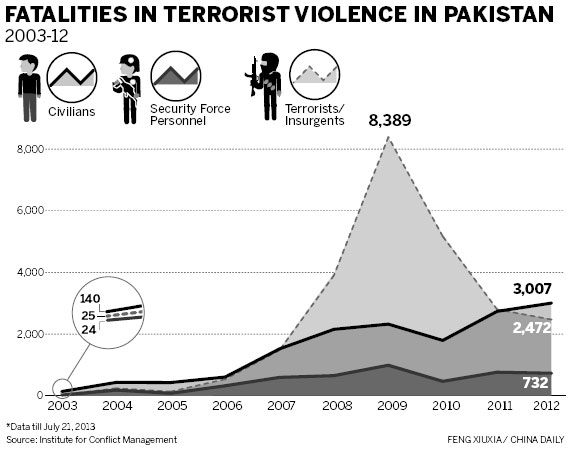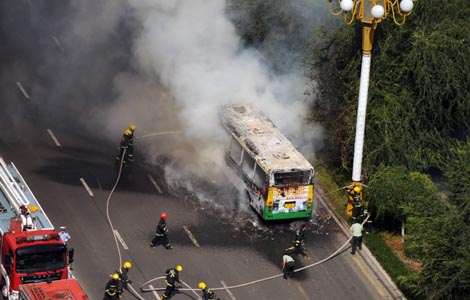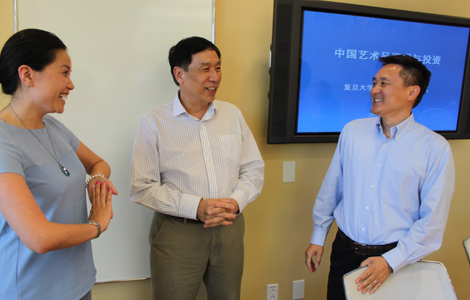The 'softer' solution to terror
Updated: 2013-08-06 08:09
By Zhang Yunbi (China Daily)
|
||||||||

Economic revival
Pakistan has paid a huge price in terms of military casualties. "Pakistan has lost 3,699 soldiers, while the other nations, including members of NATO, have lost 3,254," he said. Pakistani soldiers must also cope with longer deployments than soldiers from other countries - 26 months on average.
In the hope of building on the hard-won military gains, Pakistan is now putting energy into social and economic development projects, an approach it sees as a "softer" solution to terrorism. Greater prosperity can help locals resist the temptation of earning money from terrorist activities, Askari said.
Projects to improve living standards are a pillar of the revival plan for the region, aimed at bringing more income to less developed areas. As part of the new strategy, the Pakistani government has financed poultry and cattle farms, and established markets to boost local trade.
Despite the country's difficult terrain, a 600-km road is being constructed in Pakistan, aimed at facilitating business links to poorer areas.
"About 265 km of road have been completed and 213 km are under construction," Askari said.
Development of national transportation "is now of great security significance" for Pakistan, said Hu Shisheng, director of the Institute of South and Southeast Asian and Oceanian Studies at the China Institutes of Contemporary International Relations.
"A public transport network that connects the whole country can help ensure national security and prevent violence and turbulence," Hu said.
However, analysts said there is still a long way to go because "various international players" are supporting the terrorists in Pakistan.
In a blast in the southern city of Sukkur on July 24, at least six people were killed and more than 35 others were injured when unknown militants attacked Pakistan's Inter Services Intelligence Agency, local media and police said.
"There are so many vested interests in the region at this point in time, creating new plots and conspiracies," said Najam Rafique, director of the Americas department at the Institute of Strategic Studies in Islamabad.
Rafique said the lack of incentives and the poor security situation make it difficult for foreign investors and enterprises to come to Pakistan.
"The problem lies here in the country, which needs to implement policies that can create investor confidence," Rafique said.
Contact the writer at zhangyunbi@chinadaily.com.cn
- US, Pakistan to start new chapter in relations
- US, Pakistan agree to start new chapter in long-strained relations
- Kerry opens talks in Pakistan on anti-terror co-op
- Kerry in Pakistan on unannounced visit
- US Secretary of State to visit Pakistan
- Sharif's ally elected president
- Pakistan condemns latest US drone strike
- Pakistan to elect new head of state
Most Viewed
Editor's Picks

|

|

|

|

|

|
Today's Top News
Obesity rate on the increase
Washington Post sold to Amazon's founder
Fonterra says sorry for 'anxiety'
Detroit Symphony brings China to NYC
Service sector drives up growth
Globalization of Chinese culture becomes hot topic
Huawei expands in London
Web 'answer to export woes'
US Weekly

|

|













